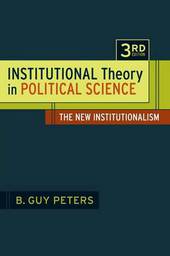
|
Institutional Theory in Political Science: The New Institutionalism
Paperback / softback
Main Details
| Title |
Institutional Theory in Political Science: The New Institutionalism
|
| Authors and Contributors |
By (author) Professor B. Guy Peters
|
| Physical Properties |
| Format:Paperback / softback | | Pages:232 |
|
| ISBN/Barcode |
9781441130426
|
| Classifications | Dewey:320.01 |
|---|
| Audience | | Professional & Vocational | |
|---|
| Edition |
3rd edition
|
|
Publishing Details |
| Publisher |
Continuum Publishing Corporation
|
| Imprint |
Continuum Publishing Corporation
|
| Publication Date |
15 December 2011 |
| Publication Country |
United States
|
Description
Institutional Theory in Political Science provides an in-depth analysis of contemporary institutional theory, an essential tool to understand the world of politics and government. Written by B. Guy Peters, a prominent expert in the field, the book argues that the new institutionalism comprises eight variations on the theme of institutional analysis. Through a series of questions, the author assesses the possibility of a unified theory within institutionalism and its potential as a paradigm for political science. This new edition incorporates the most recent developments in the research on the various institutionalisms. It also includes a new chapter that brings into the discussion themes of discursive politics and constructivism. Although the focus is on political science, attention is paid to institutionalism in other disciplines. Institutional Theory in Political Science, 3rd Edition, reflects the state of the field today while building on the foundations set in the previous editions. This unique work will be of value to anyone studying institutionalism, as well as political institutions, and public administration.
Author Biography
B. Guy Peters is Professor of Political Science at the University of Pittsburgh, USA. He is the author or editor of over 60 books in political science, and a founding editor of the European Political Science Review and of Governance. He has been a guest professor in universities in almost every country in Europe and a number in Latin America and Asia.
Reviews"Institutional theory continues to constitute the backbone of political science and public administration. This book provides a well-argued, systematic and balanced account of the various strands of institutional theory. The addition of a chapter on discursive institutionalism makes it an even more complete guide to institutional theory that will be of great value for students and scholars alike." - Jacob Torfing, Professor in Institutions and Politics, Roskilde University, Denmark "The importance of analyzing institutions has become central in political sciences and one can now speak of an "institutional revolution" on the same level as the "behavioral revolution" in the 1960s. This book gives a unique and comprehensive overview of the many different ways in which institutions are analyzed in political science and shows how the various approaches sometimes overlap and sometimes are in sharp disagreement. In addition, Peters offers many novel and original insights into this complicated intellectual terrain. Earlier editions of this book have become a widely recognize and much used standard reference and this expanded and updated edition confirms the authors standing as an internationally leading scholar in this field of research." - Bo Rothstein, August Roehss Chair in Political Science, University of Gothenburg "Over the years the 'new institutionalism' has developed into a cacophony of competing voises. It is therefore laudable that a veteran in the field has made a serious effort to create order in the literature. Peter's book is already a standard reference and the third edition will make it keep that position for several years to come." - Johan P. Olsen, ARENA Centre for European Studies, University of Oslo, Norway. "This highly readable book does a wonderful job of assessing the many different varieties and strands of institutional theory. Peters is to be commended for his full and even-handed treatment of institutional approaches that have themselves become institutionalized in political science today. In going from the origins of the 'new institutionalisms' in the older institutionalism to the explanation of how 'institutions' are defined, formed, operate, change, and are used in the many different sub-fields of political science, the book also provides a history and survey of political science in all its variety and complexity. This is a must-read for any student of political science interested in understanding what the 'new institutionalism' is all about." - Vivien A. Schmidt, Jean Monnet Professor of International Relations and Political Science, Boston University, USA. "Between globalization and subjectivism institutions remain to matter. Therefore this book is more than an academic contribution to Political Science and Public Administration. It enriches the understanding of human action as looked at in its contemporary context." - Peter L. Hupe, Erasmus University Rotterdam
|